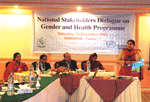The Ministry of Health (MoH) and World Health Organization (WHO) jointly launched a program aimed at mainstreaming gender issues in health system during the next biennium involving all stakeholders through the “National Stakeholders Dialogue on Gender and Health Program” recently at a local hotel in Islamabad.
Dr. Qazi Mujtaba Kamal from Ministry of Health appreciated the efforts of WHO in holding this important dialogue and assured full support of MoH at all levels, terming the mainstreaming of gender issues in health a very important aspect.
Dr. Nima Abid, Acting WHO Representative Pakistan welcomed the participants of the seminar and hoped that this consultative meeting of the concerned stakeholders would go a long way in ensuring incorporation of gender issues in health policies. He also thanked the MoH for extending all its support for organizing the event.
Masooma Butt, Gender Focal Person WHO was the moderator of the event. She shared the objectives of the national stakeholder dialogue with the audience. The objective of the event was to sensitize participants on integration of gender issues in health systems, policies and programs, to build a logical consensus on priority areas under ‘Gender and Health Program’; to develop a road map including joint action plan for implementation of this program and that gender is an important social factor with profound effects on health outcomes and should be considered in public health work.
Dr. Sabeen Afzal, Assistant Director General (MER), Ministry of Health & National Project Coordinator in her presentation Gender and Health on Gender and Health nexus: National Health Policies and Priorities said that gender mainstreaming is a process of consistently incorporating a sensitivity of gender differences in policy, planning, budgeting, and implementation of programs and projects in order to overcome inequalities between men and women, boys and girls.
Gender mainstreaming in health has the potential to transform existing policies and health delivery services to ensure that no one is denied their fundamental right to health on account of gender, she added. She further said the need of the hour is to define, interpret and apply gender in a purely Pakistani context. Only then we would be able to reduce the disparities and losses in vital areas of national development named as education, economy and health.
Rehana Hashmi, Focal Person of Ministry of Women Development shared the government’s five-point priority agenda for women including finalization of Draft Domestic Violence Against Women and Children (Prevention and Protection) Bill, 2009. She also shared with audience the process of formulating a draft bill on women’s legal ownership of property and assets that has been initiated. She also briefed the participants on the Gender Reform Action Plan (GRAP), stating that the aim is to promote women’s access to the economical, political and social empowerment at the national, provincial and district levels.
Dr. Farah Mazhar, Focal Person of Ministry of Population Welfare briefed the audience on situation analysis, implications of population growth, population policy, population program and Pakistan’s International Obligations.
Dr. Salman Asif, Gender Advisor from UNFPA gave a presentation on ‘One UN Joint Program’ that was followed by the group discussion.
After a day-long discussion, the participants agreed for conducting need assessment, capacity assessment, mapping of existing interventions and researches to identify gaps for preparing action plan, implementation on action plan, and regular monitoring of the program.

